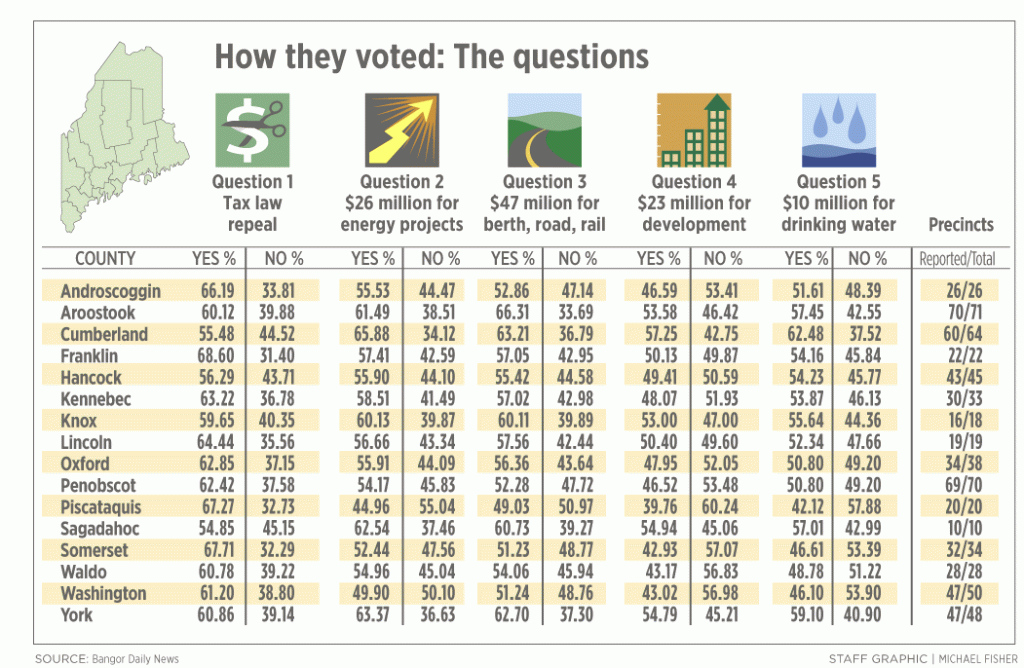It took decades of discussions and at least four years of negotiations to produce the tax reform package lawmakers passed last year. And it took one day at the polls for voters to say they got it wrong.
Now, Democrats and Republicans agree, it’ll take time before the Legislature achieves any new tax reform. And, they said, the next attempt is likely to be much less ambitious and complex.
“It’s fairly clear the people of Maine don’t want this form of tax reform. It was a resounding defeat,” said John Piotti, D-Unity, the outgoing House Majority Leader and driving force behind the reform plan.
With 95 percent of the state’s precincts reporting on Wednesday, 61 percent of the voters had voted to repeal the changes to the tax system, and 39 percent had voted to preserve them.
The reforms, passed last year with Democratic support, would have cut the state’s top income tax rate from 8.5 percent to 6.5 percent and, to offset that revenue loss, expanded sales taxes to products and services such as auto repairs that are not currently taxed.
Proponents of the changes said the plan would stabilize revenues and reduce taxes for Maine workers while raising the same amount of money for the state. Opponents criticized the package for being too complex and for shifting costs instead of reducing overall taxes or expenditures.
The repeal of the law won’t have any impact on the state’s budget, in part because the state’s revenue projections are still based on the old tax code, said Ryan Low, commissioner of the state Department of Administrative and Financial Services.
Maine’s Legislature has been studying and talking about overhauling the state’s tax system for at least 20 years in hopes of enhancing fairness and reducing costs to Maine businesses and residents. The idea of broadening the sales tax base to lower income taxes has been the primary vehicle for the past four years and began with bipartisan support.
Piotti, who is now running for the state senate, said it’ll be up to the next governor to decide when, or whether, to tackle tax reform again.
“Unless it is something that comes from executive leadership, I think the Legislature will be very averse to picking this up again on its own,” Piotti said. “I don’t think we (Democrats and Republicans in the Legislature) are going to come together. I think we had our best chance at it three or four years ago, or even two years ago.”
Sen. David Trahan, R-Waldoboro, led the repeal effort and said he’ll push for tax reform that includes overall tax reduction.
“I am not interested in letting this opportunity go by,” Trahan said Wednesday. “Now that we’ve rejected this very complicated plan, I think now we can talk about what I think is something Maine people can understand and see the value in. We’ve already submitted a bill.”
But Trahan also isn’t promising immediate results. He said the bill would essentially set the state on a course of finding ways to reduce spending and waiting for an economic rebound to produce more tax revenue. Over time, he said, the state will be able to cut income taxes without increasing taxes elsewhere.
“That I don’t think can happen overnight. It has to be done over a period of time,” Trahan said.
Rep. Josh Tardy, R-Newport, the outgoing House Minority Leader, agreed.
“Ultimately, if you are going to lower income tax rates in the state of Maine, the clear message from this (referendum) is don’t do it on the backs of service providers and consumers of necessities. Do it incrementally, based on better revenues and better times,” Tardy said.
No one is predicting better times or better revenues anytime soon, however.
“The reality is the next governor and next Legislature are going to be faced with a billion-dollar budget gap. That’s going to be priority number one,” Tardy said. “The reality is (tax reform) takes a back seat to the budget.”
Sen. Joseph Perry, D-Bangor and chair of the Legislature’s Taxation Committee, said Republicans who led the repeal effort should have a real alternative, but do not.
“I think it’s (their) obligation to come forward with a plan because that’s something, in 10 years, we’ve never seen,” Perry said.
Perry said the plan to reduce income tax rates as soon as the economy rebounds is just a feel-good solution. “It could be a decade before there’s any surplus revenue,” he said.
And cutting spending enough to reduce taxes isn’t likely to happen soon, either, according to Perry. “Unfortunately, with a billion-dollar budget hole, every efficiency, every penny is going to be used to balance the budget. It’s not available for tax reform.”
Comprehensive tax reform was a recurring issue for the Baldacci administration during the past seven years, and Baldacci Chief of Staff David Farmer said the one-sided vote on Tuesday may force future policy makers to lower their sights.
“For folks who are moving this forward, what this may say to them is it’s important to keep the changes incremental and straightforward,” he said.
Staff Writer John Richardson can be contacted at 791-6324 or at:
jrichardson@pressherald.com
Send questions/comments to the editors.



Success. Please wait for the page to reload. If the page does not reload within 5 seconds, please refresh the page.
Enter your email and password to access comments.
Hi, to comment on stories you must . This profile is in addition to your subscription and website login.
Already have a commenting profile? .
Invalid username/password.
Please check your email to confirm and complete your registration.
Only subscribers are eligible to post comments. Please subscribe or login first for digital access. Here’s why.
Use the form below to reset your password. When you've submitted your account email, we will send an email with a reset code.